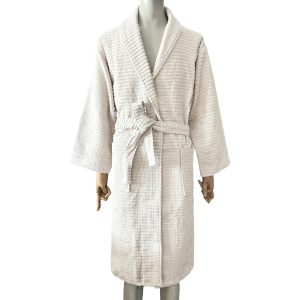As the world becomes more environmentally conscious, everyday products—such as towels—are being scrutinized for their impact on the planet. The textile industry, including the production of towels, is one of the largest contributors to environmental pollution. However, the growing demand for sustainable products is driving innovation in the towel industry. In this blog, we will explore the environmental impact of towels and how sustainable choices can help create a better future for both consumers and the planet.
1. The Environmental Footprint of Traditional Towels
Towels are a staple in every household, but the environmental cost of traditional towel production is often overlooked. The primary material used in most towels is cotton, and the production of conventional cotton comes with significant environmental challenges:
- Water Consumption: Cotton is a water-intensive crop, requiring thousands of liters of water to produce a single kilogram. The production of just one cotton bath towel can consume more than 2,000 liters of water, contributing to water scarcity in regions where cotton is grown.
- Chemical Use: Cotton farming relies heavily on pesticides and fertilizers, which can contaminate local ecosystems and waterways. These chemicals not only harm biodiversity but also affect the health of farmers and local communities.
- Energy and Carbon Emissions: The process of growing, harvesting, and manufacturing towels involves substantial energy use, leading to high carbon emissions. The energy-intensive dyeing process, in particular, contributes to greenhouse gas emissions.
2. The Rise of Sustainable Towels
In response to the environmental challenges posed by traditional towels, many consumers and businesses are turning to sustainable alternatives. Sustainable towels are made from eco-friendly materials and produced with environmentally responsible methods. Here are some of the most common sustainable towel options:
a. Organic Cotton Towels
Organic cotton is grown without the use of synthetic pesticides or fertilizers, reducing the environmental impact of cotton farming. Organic farming practices also promote soil health and biodiversity, making it a more sustainable option for towel production.
- Water Efficiency: Organic cotton farming often uses more efficient irrigation techniques, reducing water usage compared to conventional cotton.
- Reduced Chemical Use: By avoiding harmful chemicals, organic cotton farming helps protect ecosystems and reduce pollution.
b. Bamboo Towels
Bamboo is a rapidly renewable resource that grows quickly without the need for pesticides or excessive water. Bamboo towels are known for their softness, durability, and natural antibacterial properties.
- Low Environmental Impact: Bamboo can be grown on marginal land with minimal water and chemical inputs, making it a highly sustainable option.
- Biodegradability: Bamboo towels are biodegradable, reducing waste at the end of their life cycle.
c. Recycled Towels
Recycled towels are made from recycled cotton, polyester, or a blend of both. By using materials that would otherwise end up in landfills, recycled towels reduce the need for virgin resources and help lower overall environmental impact.
- Waste Reduction: By repurposing existing materials, recycled towels contribute to the reduction of textile waste.
- Energy Savings: Recycling materials requires less energy than producing new fibers, leading to lower carbon emissions.
3. Eco-Friendly Production Practices
Beyond the materials used, the production processes behind sustainable towels also play a crucial role in reducing environmental impact. Many manufacturers are adopting eco-friendly practices, including:
- Water-Saving Dyeing Methods: Traditional towel dyeing consumes a large amount of water and produces wastewater that can contaminate local water sources. Newer dyeing technologies, such as air dyeing and low-water dyeing, use less water and produce less waste.
- Renewable Energy: Some manufacturers are incorporating renewable energy sources, such as solar or wind power, into their production processes, helping to reduce carbon emissions.
- Closed-Loop Systems: In closed-loop production systems, water and chemicals are recycled and reused, minimizing waste and environmental pollution.
4. The Importance of Towel Longevity
One of the most sustainable choices consumers can make is to invest in high-quality towels that last longer. The longer a towel can be used before it needs to be replaced, the lower its overall environmental impact. Low-quality towels may lose their softness and absorbency after just a few washes, leading to frequent replacements and increased waste.
To extend the life of towels:
- Choose durable materials such as organic cotton or bamboo.
- Follow care instructions to maintain the towel’s softness and absorbency.
- Repair or repurpose old towels instead of discarding them.
5. The Role of Consumers in Sustainable Towel Choices
As consumer awareness of sustainability grows, more people are seeking eco-friendly products, including towels. Here’s how consumers can make a positive impact:
- Opt for Sustainable Materials: Look for towels made from organic cotton, bamboo, or recycled fibers.
- Support Ethical Brands: Choose brands that prioritize sustainable production practices and fair labor conditions.
- Consider Eco-Friendly Packaging: Many sustainable towel brands also use recyclable or biodegradable packaging, further reducing their environmental footprint.
- Educate Others: Spread awareness of the importance of sustainable towel choices and encourage others to consider their environmental impact.
6. The Future of Sustainable Towels
As demand for sustainable products continues to rise, the towel industry is likely to see further innovation. Researchers and manufacturers are exploring new materials, such as hemp and lyocell, that could provide even more eco-friendly options for towel production.
Moreover, technological advancements in water and energy-saving production methods will likely become more widespread, helping to reduce the overall environmental impact of towel manufacturing.
Conclusion
Towels are an essential part of daily life, but their production can have a significant environmental impact. By making sustainable choices, both consumers and manufacturers can contribute to a better future. Whether it’s selecting organic cotton towels, bamboo alternatives, or supporting eco-friendly production practices, there are many ways to reduce the environmental footprint of towels.
As the world moves toward a more sustainable future, the choices we make today will have a lasting impact on the planet. By opting for sustainable towels, we can enjoy everyday luxury while helping to protect the environment for future generations.




















